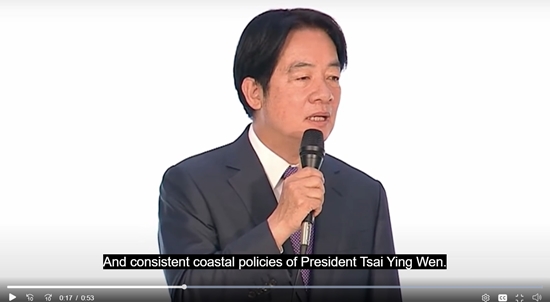
Now we have translations of the Q&A. When we first reported on the recent press conference held by Vice President Lai Ching-te, the Democratic Progressive Party candidate for the presidency of Taiwan, and his running mate Hsiao Bi-khim, we quoted only Lai’s opening remarks. These were given in English, which he did not use when answering questions.
A transcript of the questions and answers, with translations of the Chinese, is currently archived as a Google document.
One of the exchanges indicates that if he becomes president, Lai will try to be as nice to China and as cooperative with China as he possibly can.
“As long as there is equality and dignity, I am willing to cooperate with China under the goal of enhancing the welfare of the people. However, during President Tsai’s eight-year term, despite her extending much goodwill, China did not respond positively. I hope that if I am elected President, China will understand that peaceful development is a responsibility shared by both sides. Taiwan will not change its friendly stance, our hope for cooperation, and our aspiration for peaceful prosperity across the Strait. I also hope that China will realize the changes in the international situation and return to the international order, while playing an important role in maintaining peace and stability in the Indo-Pacific region.”
The questioner, Will Glasgow of The Australian, had been asking what Lai can do to make dialogue happen with China aside from “keeping the door open to dialogue.” The answer, aside from agreeing to surrender Taiwan to China, is zero. There is nothing for Lai to say beyond “If they want to talk, we’ll talk. We’ll be nice to them, so let them be nice to us too.”
Lai seems to feel that he has to talk this way, about Taiwan’s “friendly stance” toward China, etc., despite his view, in contrast to the views of his opponents, that Taiwan must unequivocally resist China’s pressure on Taiwan.
Do you really need to pretend to be “friendly” toward the evil totalitarian bully who keeps threatening to beat you up unless you give him all your stuff? Maybe. If so, just make sure that you’re also focusing hard on the requirements of self-defense.
China has no interest in being nice. The leadership of China does not want to talk to the leadership of Taiwan unless Taiwan’s leadership in some form accepts the necessity of surrendering Taiwan to China, then “negotiates” with China on this basis. This isn’t nice.
Although many other answers given in the press conference are less than satisfying, Lai made at least a few strong statements about China. One was in response to a question from TV Asahi Corporation about how “the Chinese People’s Liberation Army conducted live-fire drills in the East China Sea. Do you think this is an intervention in Taiwan’s elections?”
“China intervenes in every Taiwanese election, but this time it is the most severe,” Lai said.
“They have employed a full spectrum of tactics including propaganda, military intimidation, economic means, cognitive warfare, disinformation, threats, and inducements. In this election, China is clearly using the theme of ‘war and peace’ to try to influence the outcome and establish a pro-China regime. The people of Taiwan are aware of this attempt by China and will use their sacred votes to exercise the power of democracy and prevent China’s interference. If China’s intervention succeeds, and they manage to dictate or support who gets elected, then the very essence of Taiwan’s democracy would be lost. Taiwan would no longer be electing a president, but rather a chief executive, just like in Hong Kong.”
Later in the press conference, Lai said:
“We have ideals about peace, but we cannot be delusional. Accepting China’s One-China Principle is not real peace. Peace without sovereignty, as in Hong Kong, is a false peace. Therefore, our stance is to build a power of deterrence. This includes strengthening our national defense capabilities, whether in terms of military procurement or bolstering our defense autonomy. Over the past seven to eight years under President Tsai Ing-wen’s leadership, we have increased our defense budget. We have also reinstated mandatory military service to one year and engaged in various exchanges and cooperation with the United States and internationally, to enhance Taiwan’s ability to protect our nation and to convey to the international community Taiwan’s determination to defend our country.”
All this is premised on recognition of the obvious: the threat of China. It’s obvious to Lai and it’s obvious to many of Taiwan’s voters. It’s not obvious to everyone.
For example, the UK newspaper The Guardian is “reporting,” in a blurb describing an article details of which we found dubious in another post, that “China is the least of our problems, say Taiwan’s voters on eve of election.”
The least. The very least. That’s what “Taiwan’s voters” “say.” Job, bills, relationship trouble, bad weather, the washing machine making funny noises, then, way down at the bottom, the ratcheted-up bribes and verbal and military threats from nearby China in pursuit of its unswerving goal of taking over Taiwan and destroying its freedom and democracy.





